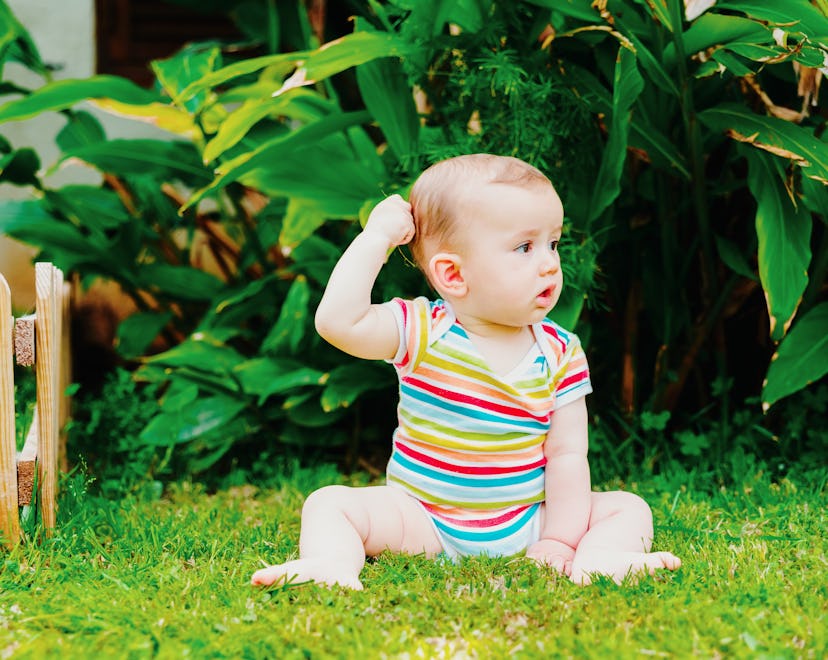Baby

Here’s Why Your Baby Keeps Yanking Out Their Own Hair
It looks like it hurts, but it actually fulfills a lot of needs for your baby.
Babies are fascinating little creatures, aren't they? Before they can speak, they can communicate with you in a variety of ways, even if it looks like it hurts, like when babies pull their own hair. Turns out that even then, they're sending you a message. It’s up to you as a parent to decode exactly what it means.
Charisma Garcia, M.D., board-certified pediatrician at Texas Children’s Health Plan The Center for Children and Women, tells Romper in an interview that a baby tugging on their hair could be their way of soothing themselves. Or, maybe they just realized, “Hey, I have hair on my head!”
Hair Play Is Self-Soothing & Helps Babies Explore
“Children have a variety of very interesting self-soothing behaviors. It is not unusual for them to pull on their hair, yank at their ears, bite their nails, and sometimes even bang their heads on the walls,” Garcia says. “It is natural for them to be curious and want to learn about their growing bodies. It might be the first time they realize they have hair, or know how to use their little hands to explore. Babies love different sensations and textures and may find the feel of their hair enticing. All babies are curious; that is how they learn.”
In an interview with Romper, Jen Trachtenberg, M.D., a pediatrician, author and creator of Pediatrician in Your Pocket, agrees with Garcia about that exploration idea. "Baby may often start touching or playing with their hair as they begin to explore their environment that's within reach of their little arms and hands. Most often this fascination disappears on its own when something else gets their attention. For some infants, it may continue and become a comforting way to calm or self-soothe, especially when baby is overtired, upset, hungry, or even bored."
But Babies.co, a UK-based parenting website, noted that when a baby under the age of 12 months pulls their own hair, it can be a sign of stress. For a baby, that usually means being upset, tired, or irritated about something. By pulling on their own hair, it is an attempt to self-soothe and feel in control of the situation around him.
Take Notice Of When Your Baby Is Pulling Their Hair
Many parents struggle with the issue of baby's hair pulling in some form or another, and it usually happens around bedtime. Experts agree that if your baby pulls their hair shortly before going to sleep, it is a sign of tiredness. Putting them to bed earlier is one attempt at a solution. Next, if your baby pulls their hair when they get upset, it's likely a reaction to feeling stressed or anxious. Give lots of cuddles and reassurance and once again, take notes.
“Remember, your infant cannot verbally communicate their emotions so look for cues that they might be dealing with stress, exhaustion, or overstimulation,” says Garcia. “If they are fussy, distracted, or not interested in their favorite toys, they are likely due for more nap time. A daily schedule can help with this goal; babies love a structured schedule. A schedule provides reassurance, predictability and comfort. Remember, a daily schedule is not only beneficial to you, but also helps little ones know what their expectations are and reduces stress that necessitates self-soothing behavior.”
Does any of this sound familiar? If you've noticed your baby pulling his hair, it's important to observe your child to see if there's a pattern to when and where he is pulling his hair. These findings will be helpful for any potential conversations you have with your pediatrician on the subject.
Hair pulling can sometimes be a sign of something more serious. According to the Mayo Clinic, trichotillomania, also called hair-pulling disorder, is a mental disorder that involves recurrent, irresistible urges to pull out hair from your scalp, eyebrows or other areas of your body, despite trying to stop. The Trich Stop website reports that while trichotillomania is most likely to begin between the ages of 9 and 13, but any person can develop trichotillomania at any age, and it has been reported among infants as young as 1. It’s very rare, but something to keep in mind if you notice your baby is missing a significant amount of hair.
“Though odd, hair pulling may not always be due to a mental or physical health concern,” says Garcia. “If you are concerned this behavior seems out of character for your baby, call your pediatrician.”
Sources:
Jen Trachtenberg, M.D., pediatrician, author and creator of Pediatrician in Your Pocket
Charisma Garcia, M.D., board-certified pediatrician, Texas Children’s Health Plan The Center for Children and Women
This article was originally published on